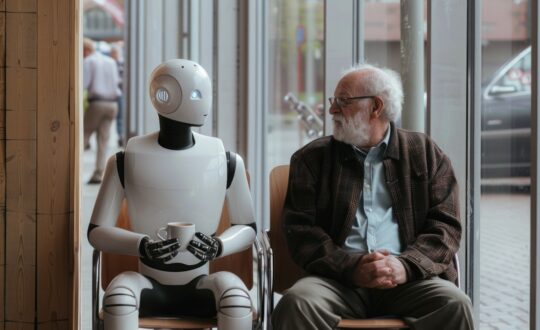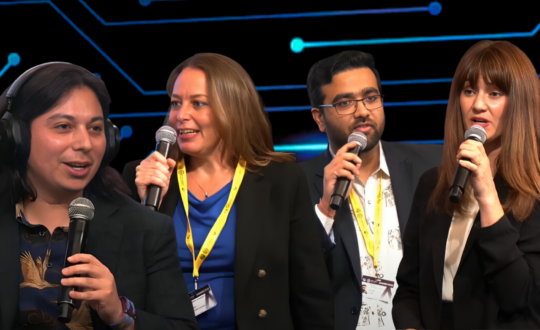AI will increase efficiency and productivity to an extent far beyond the current limitations of human labor. AI-powered automation may create factories full of workers that never sleep, eat, or expect pay for the day’s labor. As this type of production process yields higher economic output, how will we ensure that the associated financial gains do not accrue just to the owners of AI-powered machinery? How can we ensure developing nations can continue to develop towards prosperity?
 Peter LeeCorporate Vice President, Research & IncubationsMicrosoft
Peter LeeCorporate Vice President, Research & IncubationsMicrosoft Wendell WallachCarnegie/Uehiro Fellow and Co-direct of the AI and Equality InitiativeCarnegie Council for Ethics in International Affairs
Wendell WallachCarnegie/Uehiro Fellow and Co-direct of the AI and Equality InitiativeCarnegie Council for Ethics in International Affairs Lynne E. ParkerAssociate Dean of Tickle College of EngineeringUniversity of Tennessee-Knoxville (UTK)
Lynne E. ParkerAssociate Dean of Tickle College of EngineeringUniversity of Tennessee-Knoxville (UTK) Anja KaspersenDirectorIEEE
Anja KaspersenDirectorIEEE Sam MolyneuxGMPoppy
Sam MolyneuxGMPoppy Philippe BeaudoinVP Research Group and Co-FounderElement AI
Philippe BeaudoinVP Research Group and Co-FounderElement AI Ankur VoraDirector, Strategy, Innovation, & ImpactBill and Melinda Gates Foundation
Ankur VoraDirector, Strategy, Innovation, & ImpactBill and Melinda Gates Foundation
AI innovation will be central to the achievement of the United Nations' Sustainable Development Goals by capitalizing on the unprecedented quantities of data now being generated by sensors, mobile and embedded devices/chips, IoT, and satellites related to sentiment behavior, human health, commerce, communications, migration and more. What are the datasets and practical means of capturing them, protecting them, and exploiting them with the greatest potential to deliver insight able to assist us meeting the grandest challenges facing humanity? How can we provide increased access to data sets that will provide great insight where protection of individuals and their anonymity is critical? And considering that data resources result from digitalization, a process many countries are only just beginning, how might we democratize access to the data-derived insight to inform future development strategies? Furthermore, what are the practical issues involved in deploying operational systems to support decision-making on the ground and at scale?
 John QuinnPulse Lab Kampala
John QuinnPulse Lab Kampala Chris EarneyDeputy of UNHCR Innovation, UN High Commissioner for RefugeesUNHCR
Chris EarneyDeputy of UNHCR Innovation, UN High Commissioner for RefugeesUNHCR Moustapha CisséResearch Scientist and Head of Google AI Center, AccraGoogle
Moustapha CisséResearch Scientist and Head of Google AI Center, AccraGoogle Fei-Fei LiProfessor, Computer Science Department and Co-Director of Stanford’s Human-Centered AI InstituteStanford University
Fei-Fei LiProfessor, Computer Science Department and Co-Director of Stanford’s Human-Centered AI InstituteStanford University Leila ZiaSenior Research ScientistWikimedia Foundation
Leila ZiaSenior Research ScientistWikimedia Foundation Lars BromleyPrincipal AnalystUnited Nations Satellite Centre (UNOSAT)
Lars BromleyPrincipal AnalystUnited Nations Satellite Centre (UNOSAT) Rene Clausen NielsenInformation Management LeadIFRC
Rene Clausen NielsenInformation Management LeadIFRC
The practice of medicine is now augmented by AI systems that can process the entire history of recorded medical research and analyze large datasets of medical imagery. These systems guide evidence-based treatments and inform healthcare policy. Initial deployments of these AI medical systems are largely in the developed world, which further expands the gap between medical standards and practices around the world. What are the foundational requirements for extending AI-enhanced medicine to the developing world?
The world needs to maintain quality of life for the billions of people living in increasingly dense, urban environments. Improvements in sensor technology, Internet connectivity, and autonomous vehicles will improve the capabilities for building “smart cities.” How will we improve the quality of urban life by improving the social and physical infrastructure of cities? How can corporations and governments work with AI technologies to improve communities?














